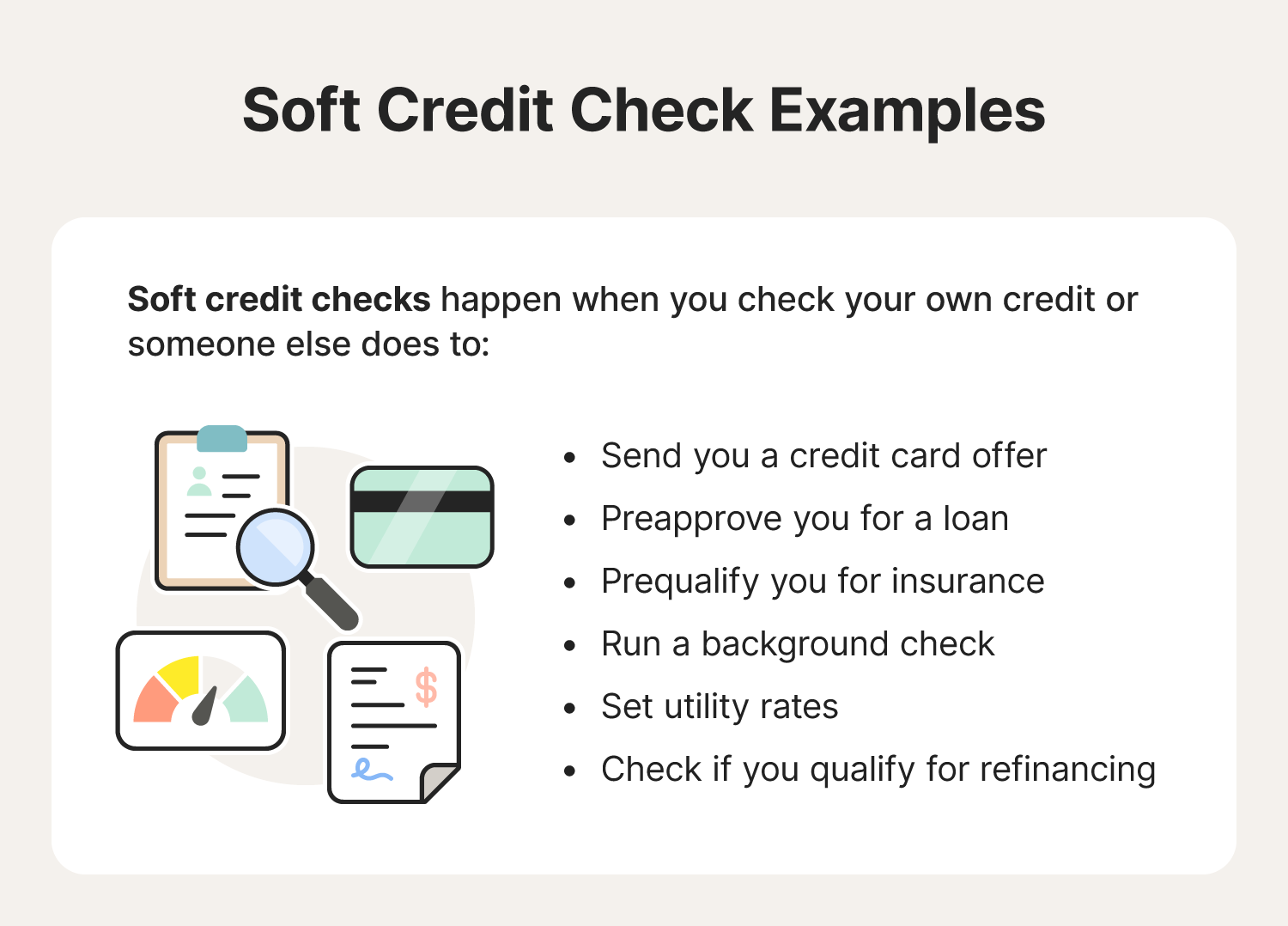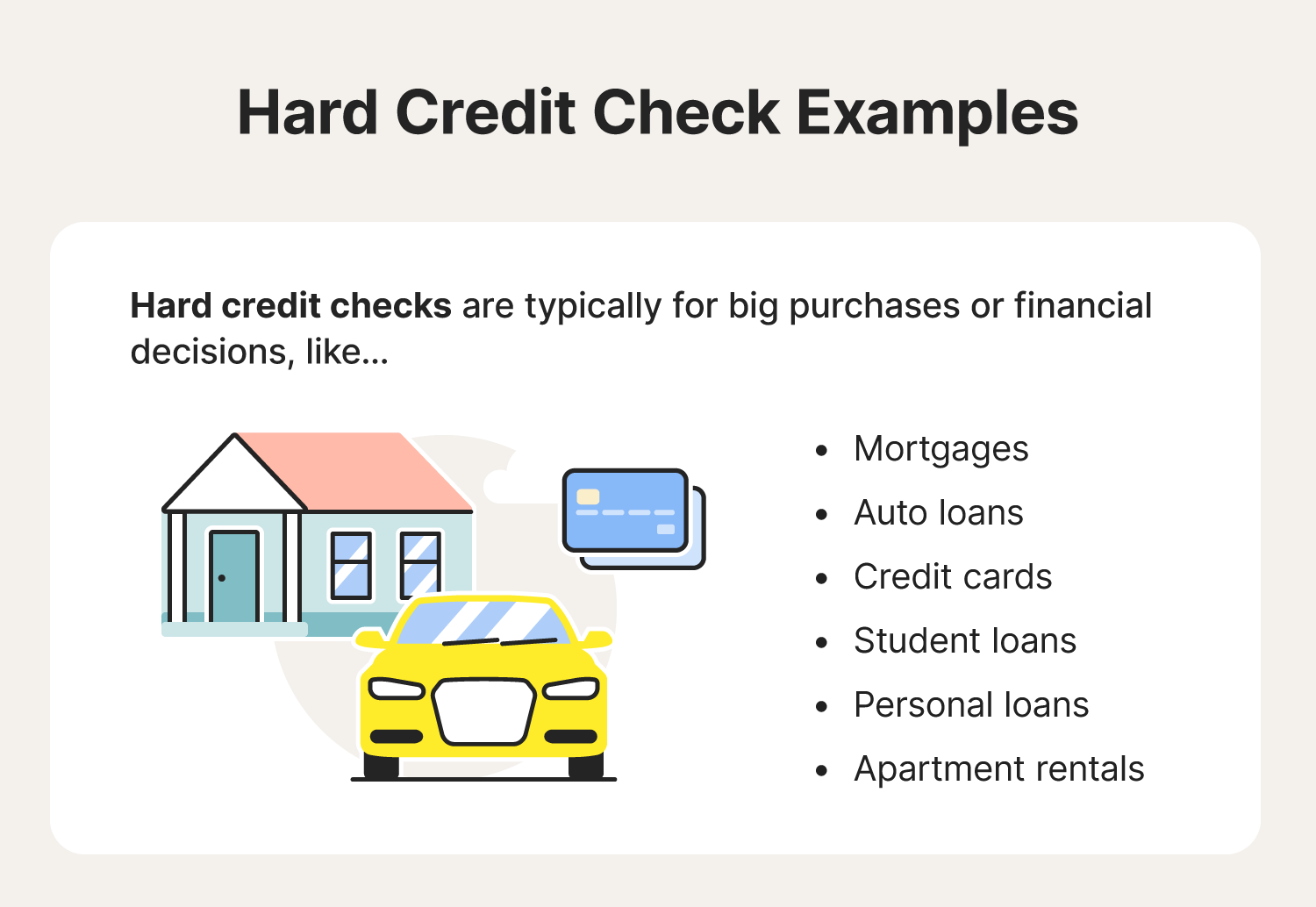| Soft credit checks | Hard credit checks |
|---|---|
| Are made for non-borrowing purposes (or when you check your own score) | Are made when applying for credit (like a new credit card or a mortgage) |
| Don't affect your credit score | Can decrease your credit score |
| Stay on your credit report for up to two years | Stay on your credit report for up to two years |
| Are invisible to credit lenders | Are visible to credit lenders |
Credit checks (also known as credit inquiries or credit pulls) fall into two categories: soft inquiries and hard inquiries. While both types of credit check look into your credit history, they have different implications for your credit score.
In short, soft credit checks don’t affect your credit score while hard credit checks can have a minor negative impact.
In this post, we'll expand on the key differences between soft and hard credit checks, provide examples of each, and explain how you can minimize the impact of hard inquiries on your credit score.
Soft vs. hard credit checks
Soft credit checks are used for non-borrowing-related reasons like personal credit score lookups or renter background checks, and they don’t impact your credit score. Hard credit checks are used by lenders to check your creditworthiness when you apply for a new line of credit, and they can decrease your credit score.
Here’s a table summarizing the key differences between soft and hard credit checks:
What is a soft credit check?
Soft credit checks are used early in the borrowing process or for purposes unrelated to borrowing. A soft check might be run as a pre-approval step at the start of a loan application, or it might happen when you’re opening a utility account. They’re also the type of credit inquiry made when you check your own credit score.
Because they’re not directly related to an application for credit, soft inquiries aren’t reported to the major credit bureaus and don’t affect your credit score.
Soft inquiry examples
Soft credit checks are run in lots of situations to assess your creditworthiness without harming your credit score. That includes the following:
- Checking your credit: When you review your credit report through a credit monitoring service or government website, you're making a soft inquiry.
- Credit card offers: Credit card issuers often send pre-approved offers based on credit history details they found through a soft credit inquiry. They might later make a hard check if you apply for the credit card.
- Loan pre-approval: The loan pre-approval process often includes a soft check to ensure you’re eligible. The lender might later make a hard check if you submit an official application for the loan.
- Pre-qualified insurance quotes: Insurance companies may use a soft credit check to determine your eligibility for an insurance product or to set your premium.
- Background checks: Employers and landlords may conduct soft credit checks as part of a broader background check to assess your financial history.
- Requesting utilities: When you apply for new utility services, the provider may perform a soft credit check to determine your eligibility.
- Account reviews by current creditors: Your current creditors may review your credit history to assess your financial situation if you request to refinance your loan. If you have a variable interest loan, they may also periodically run soft inquiries to adjust your rates.
Because soft inquiries don't affect your credit score, you don’t have to worry about negative consequences when they’re made for any of the above reasons.


What is a hard credit check?
Hard credit checks are used during the application process for mortgages, auto loans, credit cards, and other lines of credit. Lenders use hard inquiries to analyze your creditworthiness and determine your risk level before offering you a loan.
Because hard inquiries are used for new credit applications, they introduce uncertainty to your credit file. Lenders can see them as a sign of financial troubles, or they may have concerns about whether you’ll max out your new credit. This is especially likely if you make multiple credit applications in a short timeframe.
Accordingly, hard inquiries can negatively impact your credit score. A single hard credit check might only knock a few points off, but several in quick succession can cause more damage.
However, hard checks are only kept on file for up to two years, with some credit scoring models only considering inquiries from the last 12 months. That means a drop in your credit score caused by reasonable credit checks should recover by itself in time.
Hard inquiry examples
Lenders run hard credit checks to inform practically all major lending decisions. Common examples of situations that call for a hard inquiry include:
- Mortgage applications: Your home loan lender will conduct a hard credit inquiry to confirm your eligibility and decide how much you can borrow, which can temporarily drop your credit score by 3-5 points.
- Auto loan applications: During the auto loan application process, the lender will run a hard credit check to determine how much you can borrow. The result might also impact your interest rate.
- Credit card applications: Applying for a new credit card typically involves a hard credit inquiry as the issuer reviews your risk profile and determines an appropriate credit limit. This process can cause your credit score to drop by several points.
- Student loan applications: When you apply for a student loan, the lender may conduct a hard credit inquiry to determine your eligibility.
- Personal loan applications: Applying for a personal loan can trigger a hard credit inquiry as the lender assesses your creditworthiness and determines your interest rate. While there’s no set figure for how many points this will decrease your credit score by, it may have a larger impact than applying for other types of credit.
- Apartment rental applications: Some landlords may run a hard credit inquiry as part of the rental application process to evaluate your financial history and risk profile. However, they’ll typically stick to soft checks.
While hard inquiries are a normal part of applying for credit, it's important to be mindful of the number of inquiries you trigger. Too many in a short period of time can potentially lower your credit score.


How to minimize the effect of hard credit inquiries
Preparing for an upcoming hard credit inquiry can help minimize the potential negative impact on your credit score. Here are some effective strategies to consider:
- Work on your credit score: Pay bills on time, lower your credit utilization ratio, and consider seeking credit counseling if needed. These steps can strengthen your credit profile and make you a more attractive borrower.
- Consider pre-qualification: Explore pre-qualification options for loans or credit cards. This allows you to estimate your potential interest rate or credit limit so you can avoid an unnecessary hard inquiry caused by applying for an unsuitable product.
- Unfreeze your credit: If you have a credit freeze in place, temporarily lift it ahead of the hard inquiry to allow the lender to access your credit report.
- Limit new credit: Avoid opening new credit accounts in the weeks or months leading up to the inquiry to avoid multiple hard checks in quick succession.
- Lean on rate shopping windows: The Rate Shopping Exception allows you to shop around for mortgage rates over a 14-day period without having multiple hard credit checks impact your credit score. Take advantage of the window to mitigate the impact of several hard checks in quick succession.
- Get a credit report: Check your credit score and look into the accompanying report for any errors or inaccuracies. Disputing and correcting issues on your report can help improve your credit score before any new inquiry begins.
Using these strategies can minimize the impact of hard credit inquiries on your credit score and help you maintain a strong financial profile.
For more proactive oversight on your credit report, subscribe to LifeLock Advanced. LifeLock is a powerful identity theft protection service with built-in credit score monitoring features that let you easily check your credit score right from within the app.
How to dispute hard credit inquiries
If you find an incorrect or unauthorized inquiry on your credit report, taking prompt action is important. It may have been made in error, or it could be a warning sign of identity theft. Either way, a hard inquiry will affect your credit score.
By disputing these inquiries, you can work toward removing them from your report to prevent their negative impact. To remove a hard inquiry, you'll typically need to contact the credit reporting agency directly and provide evidence to support your claim.
Here's a step-by-step guide on how to dispute hard credit inquiries:
- Find the error: Carefully review your credit report to identify any inaccurate information, unauthorized lenders or creditors, or multiple inquiries made in a short period of time that you didn’t know about.
- Contact the company: Reach out to the company that made the inquiry and explain the error. Provide any relevant documentation or evidence to support your claim.
- Dispute with credit bureaus: If the company fails to resolve the issue, contact the credit bureaus (Equifax, Experian, and TransUnion) and dispute the inquiry.
- Monitor your credit: Check your credit report regularly to ensure that the inquiry has been removed.
- Consider a credit freeze: To help prevent future unauthorized inquiries, you may want to consider placing a credit freeze on your credit report.
By following these steps, you can effectively dispute hard credit inquiries and protect your credit score from potential damage.
Protect your credit score
It’s impossible to avoid hard credit inquiries if you plan to get any type of credit, including a mortgage. But you can help minimize the number of hard checks logged on your credit file by following the advice above and using LifeLock Advanced to get alerts for potentially fraudulent or unauthorized credit pulls.
With our advanced credit monitoring and identity theft protection tools, you can also keep up with key changes to your credit file and get support from a U.S.-based specialist if your financial details are used in fraudulent applications.
FAQs
What kind of credit inquiry has no effect on your credit score?
Soft credit inquiries, such as those used in personal credit score lookups and credit pre-qualification processes, don’t affect your credit score. Lenders don’t see soft pulls as a factor that should affect your credit score because they’re not associated with a request for new credit.
How long do inquiries stay on your credit report?
Both soft and hard inquiries typically stay on your credit report for two years. However, some lenders will only consider inquiries made in the last 12 months when they’re assessing your creditworthiness.
How many points will a hard credit check cost you?
A hard credit check typically costs less than five points. It's a relatively minor event compared to other factors that can significantly affect your credit score, such as late payments, missed payments, or high debt-to-credit ratios.
Can I run a soft credit check on myself?
Yes, you can use a credit monitoring tool to run a soft credit check on yourself and get insights into your credit score and history.
Editor’s note: Our articles provide educational information. LifeLock offerings may not cover or protect against every type of crime, fraud, or threat we write about.
Start your protection,
enroll in minutes.
LifeLock is part of Gen – a global company with a family of trusted brands.
Copyright © 2026 Gen Digital Inc. All rights reserved. Gen trademarks or registered trademarks are property of Gen Digital Inc. or its affiliates. Firefox is a trademark of Mozilla Foundation. Android, Google Chrome, Google Play and the Google Play logo are trademarks of Google, LLC. Mac, iPhone, iPad, Apple and the Apple logo are trademarks of Apple Inc., registered in the U.S. and other countries. App Store is a service mark of Apple Inc. Alexa and all related logos are trademarks of Amazon.com, Inc. or its affiliates. Microsoft and the Window logo are trademarks of Microsoft Corporation in the U.S. and other countries. The Android robot is reproduced or modified from work created and shared by Google and used according to terms described in the Creative Commons 3.0 Attribution License. Other names may be trademarks of their respective owners.





